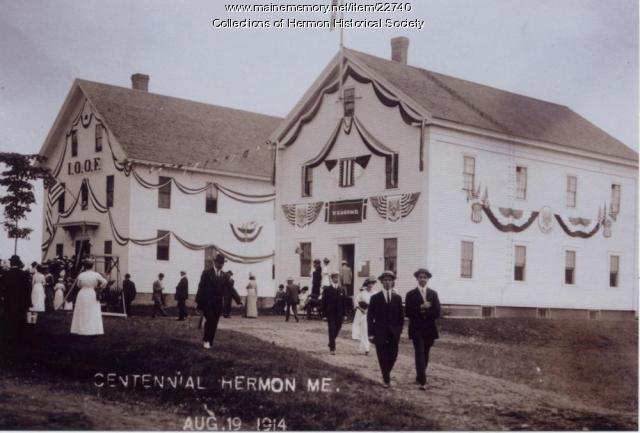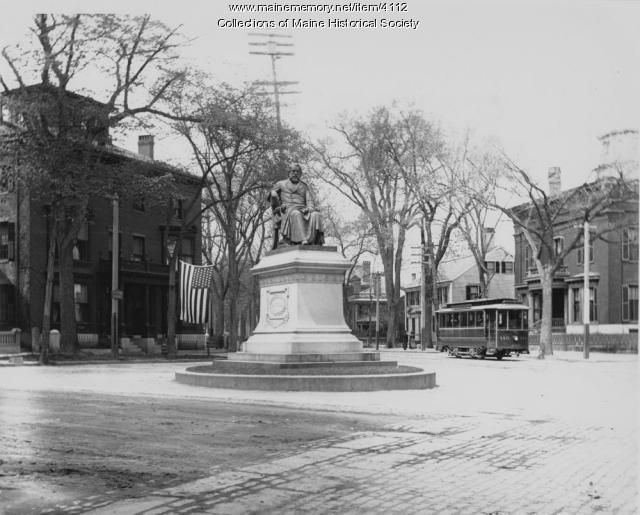Keywords: College students
Item 12578
Anti-Slavery Society of Waterville College petition, 1833
Contributed by: Colby College Special Collections Date: 1833-09-23 Location: Waterville Media: Ink on paper
Item 69266
Suggestions for Students, Farmington State Teachers College, 1951
Contributed by: Mantor Library at UMF Date: 1951 Location: Farmington Media: Ink on paper
Item 151390
Meredith College music building, Raleigh, North Carolina, 1978
Contributed by: Maine Historical Society
Date: 1978
Location: Raleigh, NC
Client: Meredith College
Architect: Carol A. Wilson; Carol A. Wilson Architect
This record contains 8 images.
Item 151504
Seton Hall Student Union, South Orange, New Jersey, ca. 2000
Contributed by: Maine Historical Society Date: circa 2000 Location: South Orange, NJ Client: Seton Hall University Architect: Carol A. Wilson; Carol A. Wilson Architect
Exhibit
A Brief History of Colby College
Colby originated in 1813 as Maine Literary and Theological Institution and is now a small private liberal arts college of about 1,800 students. A timeline of the history and development of Colby College from 1813 until the present.
Exhibit
Bowdoin College Scientific Expedition to Labrador
"The Bowdoin Boys" -- some students and recent graduates -- traveled to Labrador in 1891 to collect artifacts, specimens, and to try to find Grand Falls, a waterfall deep in Labrador's interior.
Site Page
View collections, facts, and contact information for this Contributing Partner.
Site Page
Colby College Special Collections
View collections, facts, and contact information for this Contributing Partner.
Story
Quinton "Skip" Wilson: different aspects of "standing out"
by Biddeford Cultural & Heritage Center
Recollections of life as Biddeford's only student of color during the 1960-70s
Story
Scientist Turned Artist Making Art Out of Trash
by Ian Trask
Bowdoin College alum returns to midcoast Maine to make environmentally conscious artwork
Lesson Plan
Building Community/Community Buildings
Grade Level: 6-8
Content Area: Social Studies
Where do people gather? What defines a community? What buildings allow people to congregate to celebrate, learn, debate, vote, and take part in all manner of community activities? Students will evaluate images and primary documents from throughout Maine’s history, and look at some of Maine’s earliest gathering spaces and organizations, and how many communities established themselves around certain types of buildings. Students will make connections between the community buildings of the past and the ways we express identity and create communities today.
Lesson Plan
Longfellow Studies: An American Studies Approach to Henry Wadsworth Longfellow
Grade Level: 6-8, 9-12
Content Area: English Language Arts, Social Studies
Henry Wadsworth Longfellow was truly a man of his time and of his nation; this native of Portland, Maine and graduate of Bowdoin College in Brunswick, Maine became an American icon. Lines from his poems intersperse our daily speech and the characters of his long narrative poems have become part of American myth. Longfellow's fame was international; scholars, politicians, heads-of-state and everyday people read and memorized his poems. Our goal is to show that just as Longfellow reacted to and participated in his times, so his poetry participated in shaping and defining American culture and literature.
The following unit plan introduces and demonstrates an American Studies approach to the life and work of Longfellow. Because the collaborative work that forms the basis for this unit was partially responsible for leading the two of us to complete the American & New England Studies Masters program at University of Southern Maine, we returned there for a working definition of "American Studies approach" as it applies to the grade level classroom. Joe Conforti, who was director at the time we both went through the program, offered some useful clarifying comments and explanation. He reminded us that such a focus provides a holistic approach to the life and work of an author. It sets a work of literature in a broad cultural and historical context as well as in the context of the poet's life. The aim of an American Studies approach is to "broaden the context of a work to illuminate the American past" (Conforti) for your students.
We have found this approach to have multiple benefits at the classroom and research level. It brings the poems and the poet alive for students and connects with other curricular work, especially social studies. When linked with a Maine history unit, it helps to place Portland and Maine in an historical and cultural context. It also provides an inviting atmosphere for the in-depth study of the mechanics of Longfellow's poetry.
What follows is a set of lesson plans that form a unit of study. The biographical "anchor" that we have used for this unit is an out-of-print biography An American Bard: The story of Henry Wadsworth Longfellow, by Ruth Langland Holberg, Thomas Y. Crowell & Company, c1963. Permission has been requested to make this work available as a downloadable file off this web page, but in the meantime, used copies are readily and cheaply available from various vendors. The poem we have chosen to demonstrate our approach is "Paul Revere's Ride." The worksheets were developed by Judy Donahue, the explanatory essays researched and written by the two of us, and our sources are cited below. We have also included a list of helpful links. When possible we have included helpful material in text format, or have supplied site links. Our complete unit includes other Longfellow poems with the same approach, but in the interest of time and space, they are not included. Please feel free to contact us with questions and comments.


















